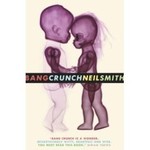David Rakoff takes the opposite view. He interviewed Julie Norem, a psychology professor that wrote a book about 'defensive pessimism' which is the idea that a certain type of negative thinking, of preparing for the negative by assessing the possible outcomes, is actually a more positive approach. The essays in this collection follow this idea of defensive pessimism, finishing with the darkest one about the author learning that the cancer he had in his youth had returned. Very dark and very funny.
Tuesday, October 25, 2011
Half Empty - David Rakoff
We've adopted this idea that we have to think positive to be successful, that thinking happy thoughts can lead to actual happiness. It runs contrary to what most of us actually think, and that's part of the challenge - change your thoughts, change your life.
Monday, October 17, 2011
Bang Crunch - Neil Smith
The style ranges from one end to the other in this short story collection. There is that too-literary style, the one that I associate with writing workshops and university creative writing classes, the ones that are too clever for their own good. "These canine teeth of mine... stick out like box seats at the opera" is a line from a story in this collection. Not a bad line, but compounded with a character named
Eeepie Carpetrod and it becomes a bit much.
Two of these stories don't suffer from this over style - Jaybird and Scrapbook - and they are the best in this collection. They demonstrate the author can indeed write without relying on the the rhetorical flourishes that look good in a writing workshop and but nowhere else.
Eeepie Carpetrod and it becomes a bit much.
Two of these stories don't suffer from this over style - Jaybird and Scrapbook - and they are the best in this collection. They demonstrate the author can indeed write without relying on the the rhetorical flourishes that look good in a writing workshop and but nowhere else.
Arguably - Christopher Hitchens
The trick with Hitchens is that he wants you to disagree with him, to take on his arguments and offer some ones of your own. You can feel it in the writing, this need to engage. This collection of essays, the first since he was diagnosed with cancer, focus on the post 9/11 decade, a time when he carved out a complex position that neither conforms to left or right. He's famously anti-religion, with a scorn that encompasses both Islam and Christianity, and thinks that the US was justified in the invasion of Iraq and Afghanistan. But he also criticizes the Bush administration over their response to Katrina.
In the end it's the writing that matters, and most if it here quite good. You shouldn't agree with everything he says (he probably would respect you more if you didn't) but it's a fun ride.
Monday, October 3, 2011
How To Be Good - Nick Hornby
After sleeping with an acquaintance, Katie begins to question her goodness. She's a doctor who doesn't really like her patients, a mother who doesn't really like her children and a wife who hates her husband, and aspiring novelist who writes a weekly Angry Man column in the local paper. She wants to think of herself as a good person, but when her husband finds a faith healer who encourages him to take in homeless, she begins to doubt.
The first part of this novel is some of the best stuff Hornby has written, but it loses steam about halfway through. As with his other characters, it's hard to really like Katie - she's too flawed, too human to either dislike or embrace completely. It this ambivalence that is a weakness in the book, leading to an unsatisfactory ending.
The first part of this novel is some of the best stuff Hornby has written, but it loses steam about halfway through. As with his other characters, it's hard to really like Katie - she's too flawed, too human to either dislike or embrace completely. It this ambivalence that is a weakness in the book, leading to an unsatisfactory ending.
Subscribe to:
Comments (Atom)



